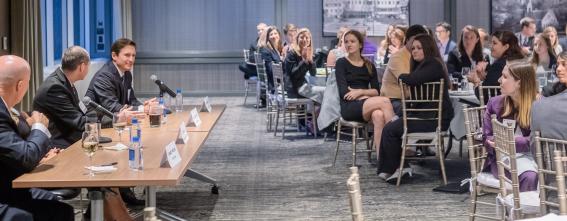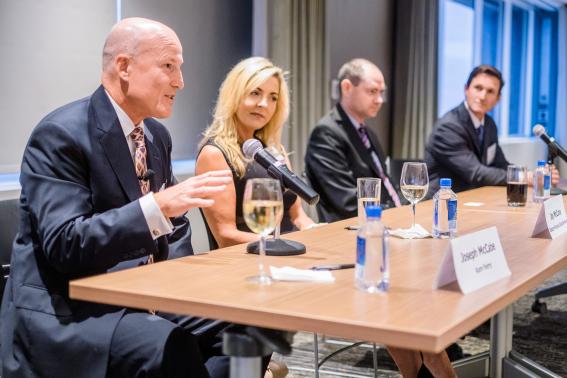Executive Panel and Workshops Prime Entering MBA Students for Success
September 26, 2016

“You want to build a network before you need it,” emphasized Joy McCune, Chief Human Resources Officer with Boston Financial Data Services. “That means having the connections to pick up the phone and ask people for their thoughts about an organization or a job opportunity. You need those people. Identify two or three new contacts a week. It should be a constant. They will help you make better choices,” observed the UMass alumna.
Joy was one of four high-ranking executives in The Isenberg MBA: Keys to Success Panel, the culminating event at the third annual David C. O’Leary MBA Leadership Orientation. The three-day orientation immerses first-year, full-time MBA students in workshops and team exercises devoted to professional development skills. For much of the retreat, on August 29-31, the students gathered at the DoubleTree Hotel in Leominster to hone networking, communications, and job-search skills. With guidance from industry experts, they also explored career trends, personality assessment, and interviewing. After 2 ½ days of workshops, they reconvened at the elegant UMass Club in Boston for the Success Panel and for networking with Isenberg alumni and other industry professionals.
Eclectic Advice from Executives
The panel also featured insights from Joseph McCabe ’82 MBA, Vice Chairman with the executive search and advisory firm, Korn Ferry; Paul Cacciatore ‘96, Director Business Operations and Arena Services with the Boston Celtics; and Ivan Matviak, Executive Vice President of Global Exchange with State Street. David O’Leary ’81 MBA, the MBA orientation’s chief benefactor and architect, moderated the panel.

“Always think about how you’re building your tool kit,” advised Ivan Matviak. In accepting new challenges and positions, Matviak frequently asks himself: “Do I stretch myself from an industry or a functional [skills] point of view?” A third option, he said, is to do both. But in embracing change, it’s important to “retain some grounding in your comfort zone.” One regret: “I wished that I had realized earlier the power of working across my peers collaboratively.” You get better answers when you collaborate with powerful teams, he remarked. Building them is a worthy investment.
“The world has changed, where people are now not afraid to change,” remarked Paul Cacciatore . . . “You better know how [you’re] going to change the company [that you work for],” he advised. The Isenberg Sport Management graduate has seen more than his share of change at the Boston Celtics, during all 21 years of his career. “I worked my way up from the bottom to running arena operations,” he noted. Along the way, he gained first-hand knowledge of many of the jobs held by those who currently work under his wing. His leadership philosophy: “Collaboration is key. Projects start at the bottom and work their way up.” That, he says, means empowering people at all levels— “Their voice matters.”
The complete panel was streamed live for the online MBA population and a recording can be watched on our website.